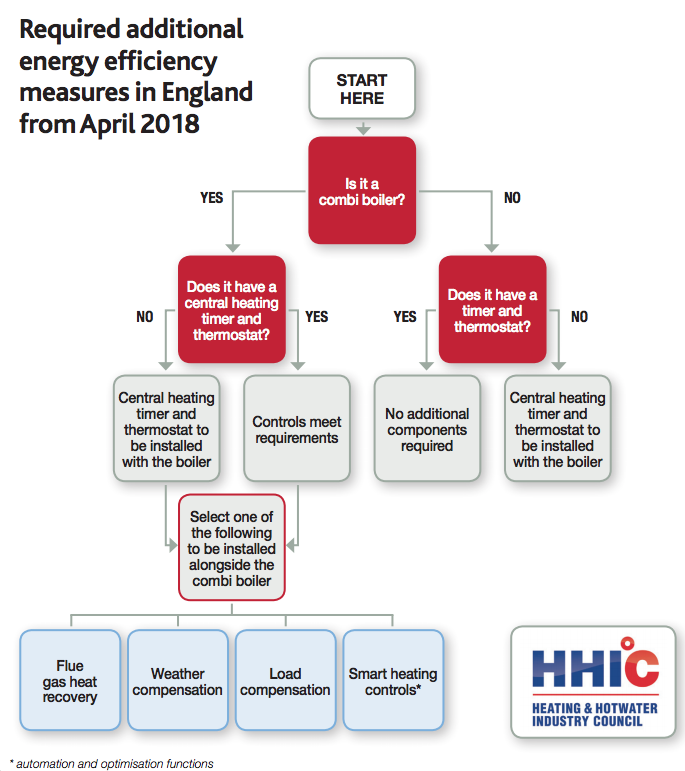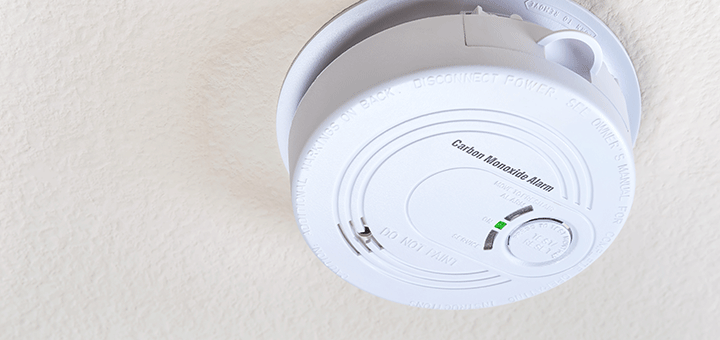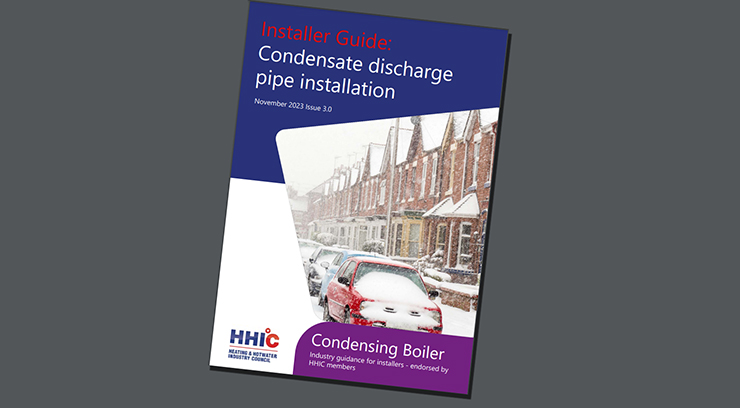
Everything you need to know about Boiler Plus
Do you know the new requirements whenever you fit a boiler in an existing system in England from April 2018? Registered Gas Engineer and HHIC set out the new standards, the measures they include – and how they will affect you and your customers.
1. What is Boiler Plus?
Boiler Plus is additional legislation to Part L of the Building Regulations, introduced by BEIS (the Department of Business, Energy and Industrial Strategy). It sets out new requirements for gas engineers fitting new boilers and heating controls, with the aim of reducing domestic carbon emissions and encouraging energy efficiency.
From 6 April 2018, changes are taking place to the minimum requirements when installing boilers in existing buildings, in England only. The Domestic Building Services Compliance Guide is a vital reference document for gas engineers, specifiers, enforcement authorities and market oversight bodies, and will be updated to reflect the changes.
The additional legislation will be:
• Any gas boilers installed or replaced in existing dwellings must be a minimum 92 per cent efficient under the ErP European rating system
• Boiler interlock, time and temperature control must be present and operational. This also applies to oil boiler replacements
• When replacing a gas combi boiler, at least one option from the following must be specified and installed:
-
- Flue gas heat recovery (FGHR)
- Weather compensation
- Load compensation
- Smart thermostat with automation and optimisation.
The HHIC has also created this flow-chart.
2. Is it optional?
No. The legislation is part of the Building Regulations, which must be followed by law.
3. How will it affect engineers?
Gas engineers will need to ensure that all boilers they specify include a boiler interlock, and time and temperature control to be present and operational. This also applies to oil boiler replacements.
Boiler manufacturers were aware of the potential change during 2017 so will only supply products that are 92 per cent efficient. There should be minimal old stock in the supply chain.
The gas engineer will need to specify a combi boiler with flue gas heat recovery, a weather compensation stat, load compensation or a smart thermostat with automation or optimisation.
4. Which measures may be suitable for which customers?
BEIS says the technologies specified are readily available and that gas engineers already have a good knowledge of which products are suitable for different applications.
The BEIS consultation document states: “Do installers know how to work with the technologies in the new standards?
“It is important that standards are set at a level that is not beyond the capability of our installers. The technologies featured in the new standards are all existing, established technologies, which are already familiar in some fashion to most installers.
“Through consultation we have learned that most installers see it as part of their job to keep up with technological developments, and so those who are not already confident with these products may choose to take advantage of the wide range of training that exists, much of which is provided for free. Individuals who do not see the value in keeping up with developments in their own field may struggle as the market moves forwards without them, irrespective of the new standards.”
5. How do I choose which technology to use?
The BEIS consultation document says: “[Consumers’] choice is likely to be influenced by a range of factors, including their installer and personal circumstance, but they could be driven by two distinct motives:
- “Cost minimisation – consumers who prefer to focus on reducing upfront cost, accepting lower benefits yet still maximising utility, would choose the lowest-cost product, ie, load compensators.
- “Benefit maximisation – consumers who focus on optimising over the lifetime of the technology select a measure that has a higher upfront cost (where they can afford to) to maximise their annual benefits in the form of bill savings. The highestperforming technology on our choice list is the learning thermostat.”
6. What are the typical energy savings of each measure?
The BEIS document sets out a typical consumer’s costs and energy savings in the first year of operation as follows:
BEIS also notes: “The results show that learning thermostats and load compensators pay back within technology lifetimes (15 years), even at the higher year-one cost. For those consumers who value lowering their upfront cost, bill savings will be significantly smaller compared to those who seek to maximise bill savings over the longer term.
“Weather compensators and FGHR will likely not be attractive offers to the majority of consumers due to the high upfront costs or long payback periods. For some circumstances, however, these technologies will be beneficial, eg, households with high hot water demands who can benefit from higher than average performance from FGHR and associated bill savings.”
* The BEIS document estimates the upfront cost of flue gas heat recovery would fall significantly to £200 from Year 2 onwards because of mass production savings, reducing the implied payback period for consumers.
7. What if my customers don’t want to fit an additional energy-saving measure?
The householder is required to comply with the Building Regulations. Having non-compliant work carried out may result in prosecution and financial penalties for the homeowner.
8. Will there be more paperwork to fill in, and what?
There is no additional paperwork to complete.
9. How will Boiler Plus be regulated and enforced, and by whom?
Gas engineers who don’t comply are breaching the Building Regulations and are therefore breaking the law and could face prosecution. This is policed by Building Control. Furthermore, if a gas engineer were to invoice a consumer for non-compliant work, it could be considered fraudulent and therefore open to action from Trading Standards.
10. Where can I find more information about how to comply with the requirements?
Building Services Compliance Guide Part L – Conservation of fuel and power
BEIS: Boiler Plus: New standards for domestic boiler installations from April 2018, Frequently Asked Questions
You can download our easy-to-follow guide here: Boiler_Plus_Are_You_Ready




